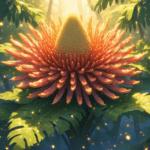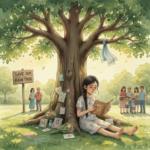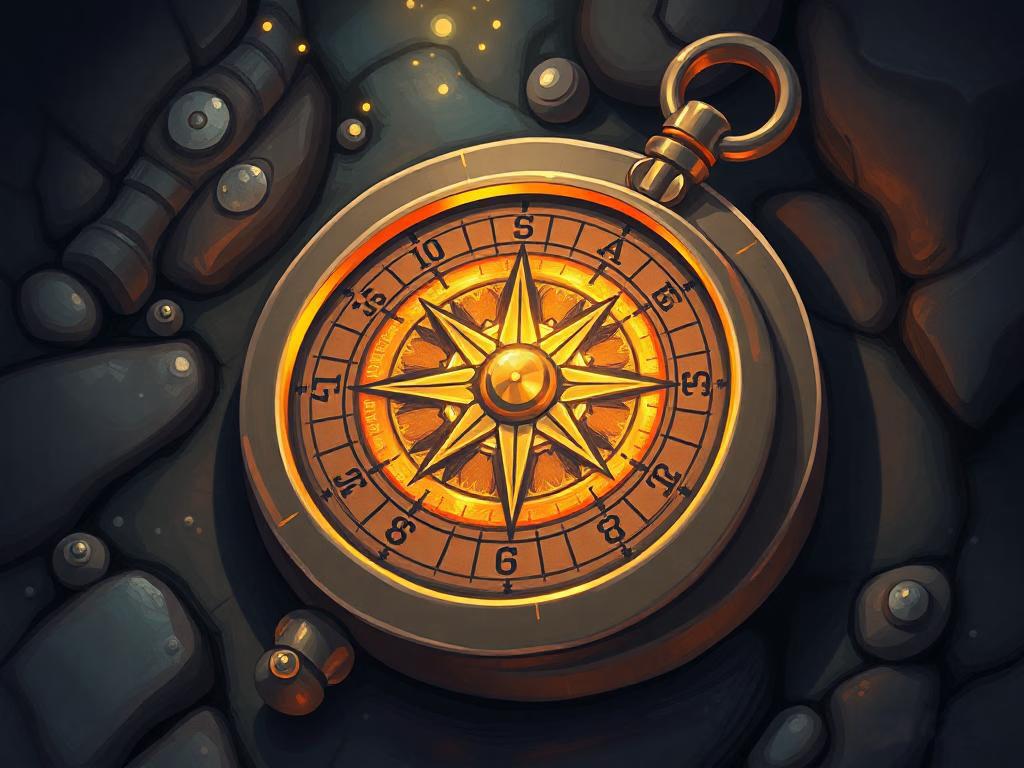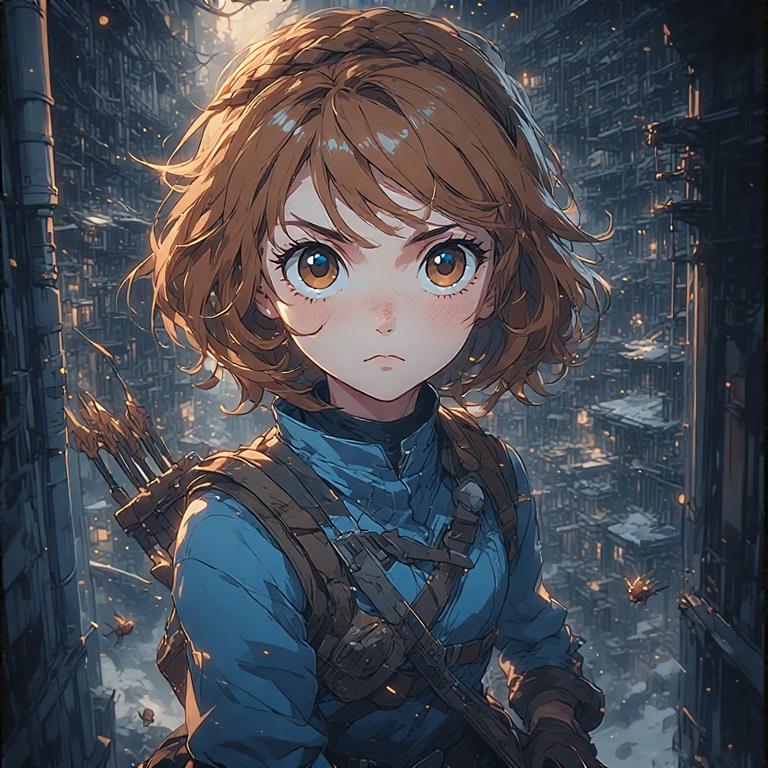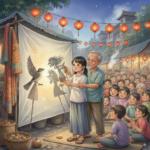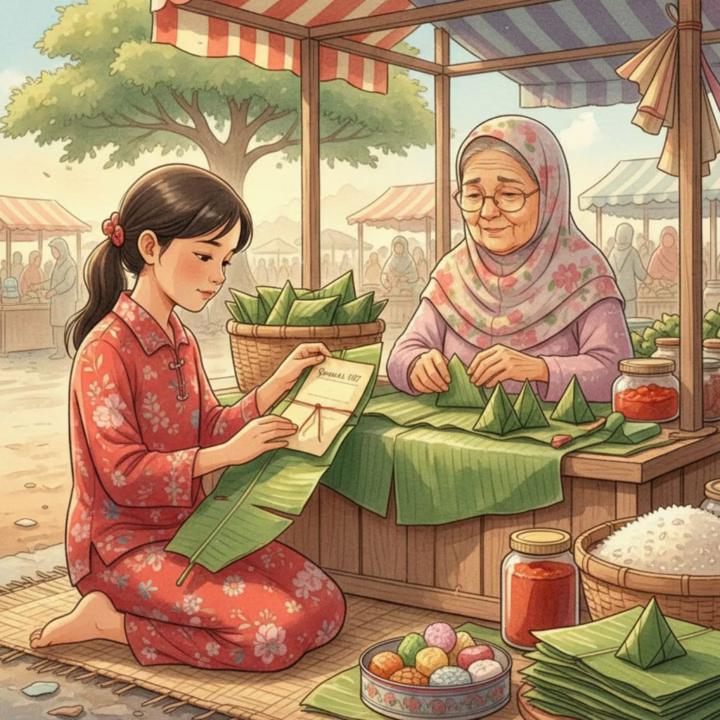
The morning mist still clung to the edges of the Kuala Lumpur market when twelve-year-old Lina arrived with her Nenek, her grandmother, carrying a basket of banana leaves and a steaming pot of coconut rice.
“Hurry, sayang,” Nenek said, her voice warm but brisk. “The best customers come before the sun climbs too high.”
Lina tied her hair back with a red ribbon and began laying out the banana leaves on the wooden stall—wide, waxy, and smelling faintly of earth and rain. Every morning, they sold nasi lemak—coconut rice wrapped in banana leaf, served with spicy sambal, crispy anchovies, roasted peanuts, and a slice of cucumber. It was Nenek’s recipe, passed down from her grandmother, and everyone said it tasted like home.
As Lina folded the first leaf into a neat triangle, something caught her eye. Tucked beneath the stack, wrapped tightly like a secret, was a small bundle tied with faded blue string. It wasn’t one of their usual leaves. This one was brittle, yellowed at the edges, and smelled faintly of old paper and cloves.
“What’s this?” Lina asked, carefully unwrapping it.
Nenek turned, her hands pausing mid-fold. Her eyes widened slightly, then softened like clouds after rain.
“Oh,” she whispered. “That old thing.”
Inside the leaf was a folded piece of paper, the ink faded but still legible. At the top, in careful cursive, it read:
September 1, 1957
My dearest Amina, if you receive this, know that I have not forgotten you…
Lina’s breath hitched. “Who’s Amina? And… 1957? That’s the year Malaysia became independent!”
Nenek sighed and wiped her hands on her apron. “That letter… it was meant to find someone. A friend. A very long time ago.”
“Why didn’t she get it?” Lina asked.
Nenek looked out over the waking market—the clatter of pots, the call of hawkers, the scent of turmeric and chili in the air. “Because war came. Then independence. Then people moved, names were lost, roads changed. The letter never reached her.”
Lina’s fingers trembled as she read the next line:
I promised I’d return after the harvest, but the world turned too fast. If you’re reading this, I want you to know—I kept your kuih recipe safe. And I never stopped thinking of our laughter beneath the rain tree.
“Nenek,” Lina said slowly. “Did you write this?”
Nenek smiled, a soft, sad thing. “No. But I knew the girl who did. Her name was Siti. She was my best friend. We were twelve, just like you, when the British left and everything changed. Her family moved to Malacca during the turmoil. We promised to write. But letters got lost. People got busy. Life happened.”
Lina stared at the paper. A real letter from 1957. A real friendship, broken by time.
“I want to find her,” Lina said suddenly.
Nenek raised an eyebrow. “Siti would be… oh, nearly ninety now, if she’s still alive.”
“So?” Lina said, her voice rising with determination. “If she’s out there, she should know this letter survived. She should know you remembered.”
Nenek looked at her granddaughter—so fierce, so full of fire—and for the first time in years, she saw herself at twelve, standing beneath a rain tree, promising forever.
“Alright,” she said softly. “But we’ll need help.”
Their search began with the letter itself. Lina scanned it, took photos, and posted it on a local history group online. She even showed it to her teacher, Mr. Raj, who taught Malaysian history and had a shelf full of old maps.
“1957 was a turning point,” he said, adjusting his glasses. “Families moved, villages changed. But records exist. Old school registers, temple and mosque logs, community boards.”
Lina spent weekends at the National Archives, digging through dusty files. She found a Siti binti Abdullah, born in 1945, listed in a 1956 school register at Sekolah Rakyat Kampung Baru.
“That’s her!” Lina whispered.
With Nenek’s help, they called community centers in Malacca. They wrote letters—real ones, wrapped in banana leaf, just like the old days. They even visited a retired postman who used to deliver mail by bicycle in the 1960s.
And then, one rainy afternoon, a reply came.
It was a shaky handwriting on lined notebook paper.
To the kind girl who found the letter,
My mother’s name was Amina. She passed five years ago. But she kept a letter too—one from a girl named Fatimah, promising to send her mother’s kuih recipe. She read it every Merdeka Day. She always said, “One day, someone will remember.”
Thank you for remembering. My name is Norah, Amina’s daughter. And yes… we still make that kuih. Would you like the recipe?
Lina cried. Nenek held the letter to her heart.
A week later, Lina and Nenek boarded a train to Malacca. When they arrived, an elderly woman with silver hair and kind eyes stood at the station, holding a small tin.
“Norah?” Lina asked.
The woman smiled. “And you must be the banana leaf detective.”
They laughed, and hugged, and sat on a porch strung with fairy lights, eating kuih lapis—steamed layered cake—just like the one from the letter.
Nenek looked at Norah. “Your mother… did she ever talk about the rain tree?”
“All the time,” Norah said. “She said you two used to hide there when it rained, and make up stories about being queens of the jungle.”
Nenek’s eyes shimmered. “We were.”
That night, under a sky full of stars, Lina wrote a new letter.
Dear Future Finder,
If you’re reading this, it means another story has been found. My name is Lina. I’m twelve. I love nasi lemak, history, and solving mysteries. This is the story of how a banana leaf held a promise for 67 years… and how it finally came home.
I’m wrapping this letter in a fresh banana leaf. Maybe one day, someone just like me will find it. And they’ll keep the story alive.
Because some friendships don’t end. They just wait.
She tied it with blue string—just like the old one—and tucked it beneath a stack of banana leaves at their market stall.
Just in case.
